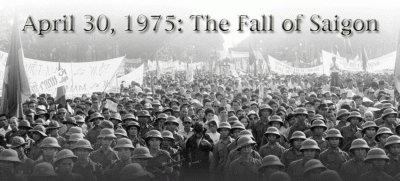The Fall of Saigon

On April 30, 1975, Saigon fell. The last Americans fled the country. Vietnam was reunited, as it was supposed to have been twenty years earlier according to an international agreement sabotaged by Washington. The Vietnam War, which had been going on for thirty years ever since France began its attempt to reconquer its lost Indochinese colonies, finally came to an end.
For the Vietnamese who died in that war, there will be no minute of silence, no solemn commemoration, no “duty to remember”, no vows of “never again”. After all, the millions of Vietnamese who died are not considered victims of “genocide “. They were merely killed by years of massive bombing and the systematic slaughter of a people who wanted to be independent. What’s so special about that ?
In old Europe we are warned every day against repeating the crimes of Nazism, a phenomenon that has been dead for over half a century. In contrast, the sources of the slaughter in Vietnam have remained alive and active, whether through U.S. policy in Central America or Southern Africa and now for several years in the Middle East. The “war against terror” has already cost over a million lives and is far from over.
What do our great European humanitarians have to say on this subject? Do those who deplore the rising number of refugees drowning in the Mediterranean see the connections? Do they realize that the same United States military drive to remake the world is the fundamental source  of these ongoing disasters? How many calls to we hear to leave the sinking ship of U.S. imperialist wars? To make a real peace with Russia and Iran? To end our policy of perpetual intervention as obedient auxiliaries of the United States?
of these ongoing disasters? How many calls to we hear to leave the sinking ship of U.S. imperialist wars? To make a real peace with Russia and Iran? To end our policy of perpetual intervention as obedient auxiliaries of the United States?
At the time of the Vietnam war, enlightened European leaders, Olof Palme in Sweden and De Gaulle in France, openly stood up against U.S. policy. Intellectuals like Bertrand Russell and Jean-Paul Sartre mobilized public opinion against war. Demonstrations took place even in countries that were far from the conflict. And today? Nothing. Public opinion was almost entirely in favor of the war that destroyed Libya, notably on “the left”.
The end of the war in Vietnam was the end of an era, the era of national liberation struggles which no doubt constituted the most important political movement of the 20th century. In the West, it marked the start of the reconstruction of imperial ideology under the cover of “human rights”. Instead of stopping liberation struggles, the emphasis would be on subverting and destroying countries that had gained independence. The media-savvy campaign to arouse “solidarity” with the plight of Vietnamese boat people and victims of the Khmer Rouge massacres in Cambodia enabled a large sector of the French and U.S. intelligentsia to drop any effort to understand the causes and effects of events. After all, the Khmer rouge would never have taken power without the combination of U.S. bombing of the Cambodian countryside and regime change in Phnom Penh. Analysis was shoved aside in favor of immediate emotional reaction to unexplained events. A moralism without context favored the invention of “the right of humanitarian intervention” in order to destroy national sovereignty, international law and the United Nations Charter.
In France, the anti-communist “new left” that emerged from May ’68, influenced by the intellectual bluff of Bernard-Henri Lévy and cohorts, completely reversed the position of the old left. Whereas the traditional left defended international peace and opposed U.S. interventionism, the “new left” welcomed every uprising regardless of political content and showed no concern for the underlying relationship of forces. All that mattered were the “human rights” as defined and highlighted by mainstream media.
Today that new left is at a dead end, whether in the Middle East or in relations with Russia or China, along with the American policy that it has helped to disguise ideologically. Forty years after Vietnam gained its freedom, it is high time for new evaluations and drastic changes. But who has the courage to meet these challenges?
JEAN BRICMONT teaches physics at the University of Louvain in Belgium. He is author of Humanitarian Imperialism. He can be reached at [email protected]
Translation by Diana Johnstone.

